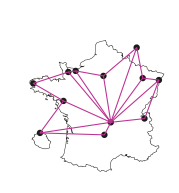
Coordination
Partners
Objectives
The use of microorganisms as preservation agents, capable of managing food ecosystems at the expense of undesirable species (pathogenic and spoilage bacteria) is an innovative technology that meets the expectations of food manufacturers and wider society, and provides prospects for innovative applications.
Actia's Joint Technological Network, Florepro, brings together fourteen partners from four different food industries (meat, seafood, dairy, and vegetables) who are working to remove the scientific, technological, and regulatory barriers related to the use of preservation cultures.
This group constitutes a unique network of expertise, at the cross-roads between basic research and applied research, working on the implementation of bio-preservation processes for better food quality and safety.
This objective necessarily implies improving our understanding of microorganisms, as well as of how the various flora that make up products' microbial ecosystems interact with the process, the matrix, and its environment. Such knowledge, located at national and European level will serve as the foundations for regulatory change and is vital for resulting in industrial applications.
This Joint Technological Network's five-year programme started in January 2016. It follows on from Actia's Joint Technological Network, Florepro, accredited for the 2009-2014 period.
Actions
Removing scientific barriers
Implementing collective R&D to explore the mechanisms of action, microbial interactions, interactions with the food matrix, and the role of processes on the dynamics of microbial flora.
Giving the work a European scope
Positioning the work at European level for future R&D projects and for their regulatory and legislative aspects.
Contributing to the establishment of appropriate regulations
Driving regulatory change on bio-preservation cultures in partnership with French and European authorities and professional bodies.
Positioning the network as a go-between for the various players (scientific research, food manufacturers, and the authorities).
Evaluating the practical, economic, and ecological advantages of bio-preservation
Evaluating the economic and ecological benefits of using beneficial micro-organisms' barrier function as a technical alternative to certain chemical additives or processes.
Evaluating the feasibility of scaling-up products and processes.





